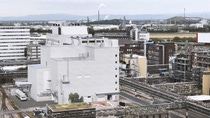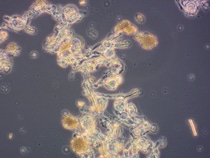Media
BASF to build new fermentation plant for crop protection products in Ludwigshafen
- Investment in the high double-digit million euro range
- Strengthening the portfolio of biological and biotechnology-based crop protection products
- Further step in the transformation of production processes in Ludwigshafen
BASF invests a high double-digit million euro amount in a new fermentation plant for biological and biotechnology-based crop protection products at its Ludwigshafen site. The plant will manufacture products that bring value to farmers including biological fungicides and biological seed treatment. BASF also plans to utilize the plant to produce the main building block of Inscalis®, a novel insecticide derived from a fungal strain. Commissioning is planned for the second half of 2025. The plant will employ 30 people in production, logistics, engineering and maintenance.
The plant will use microorganisms to convert renewable raw materials such as glucose into the desired products – a process known as fermentation.
“We see a growing demand for biological crop protection products. This investment is an important step in building an even stronger and more competitive portfolio in this area,” said Marko Grozdanovic, Senior Vice President, Global Strategic Marketing at BASF Agricultural Solutions. “In addition, fermentation is a very flexible technology that will allow us to bring more innovative biotechnology-derived products to the market in the future.”
“For production at our Ludwigshafen site, this development is another step in the transition to innovative manufacturing processes with lower energy intensity based on renewable raw materials,” said Christian Aucoin, Senior Vice President, Global Operations at BASF Agricultural Solutions. “The site offers excellent synergies due to its good infrastructure, the integration into an existing high-performance production organization and the proximity of research units such as White Biotechnology.”
About BASF’s Agricultural Solutions division
Farming is fundamental to provide enough healthy and affordable food for a rapidly growing population while reducing environmental impacts. Working with partners and agricultural experts and by integrating sustainability criteria into all business decisions, we help farmers to create a positive impact on sustainable agriculture. That’s why we invest in a strong R&D pipeline, connecting innovative thinking with practical action in the field. Our portfolio comprises seeds and specifically selected plant traits, chemical and biological crop protection, solutions for soil management, plant health, pest control and digital farming. With expert teams in the lab, field, office and in production, we strive to find the right balance for success – for farmers, agriculture and future generations. In 2022, our division generated sales of €10.3 billion. For more information, please visit www.agriculture.basf.com or any of our social media channels.
About BASF
At BASF, we create chemistry for a sustainable future. We combine economic success with environmental protection and social responsibility. More than 111,000 employees in the BASF Group contribute to the success of our customers in nearly all sectors and almost every country in the world. Our portfolio comprises six segments: Chemicals, Materials, Industrial Solutions, Surface Technologies, Nutrition & Care and Agricultural Solutions. BASF generated sales of €87.3 billion in 2022. BASF shares are traded on the stock exchange in Frankfurt (BAS) and as American Depositary Receipts (BASFY) in the United States. Further information at www.basf.com.
P-23-316

